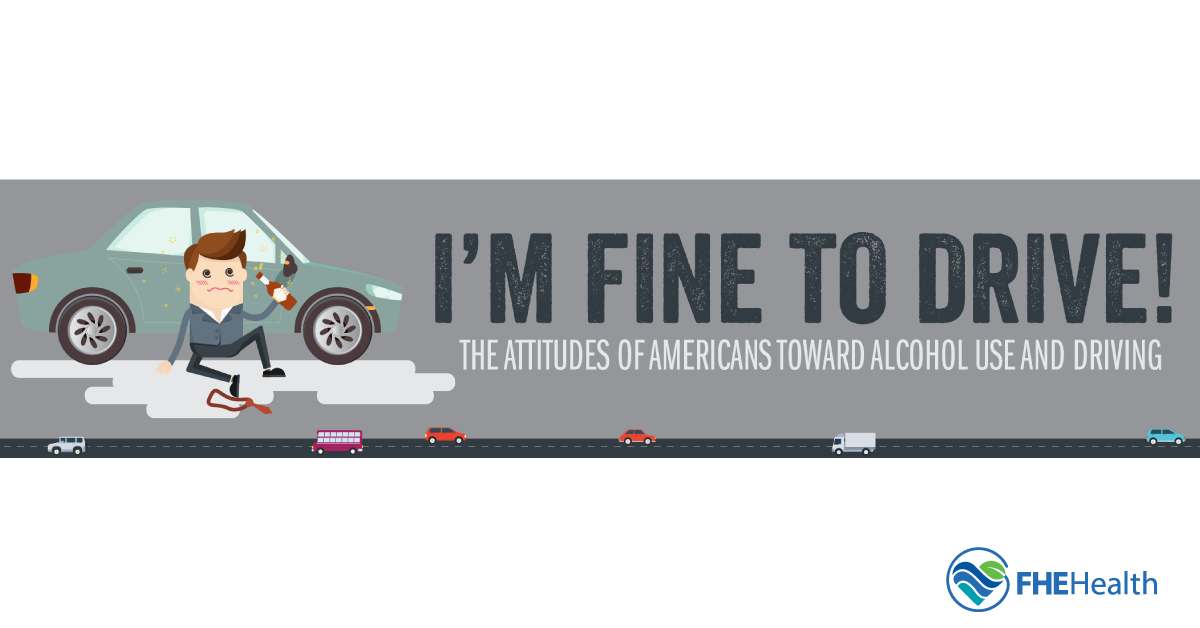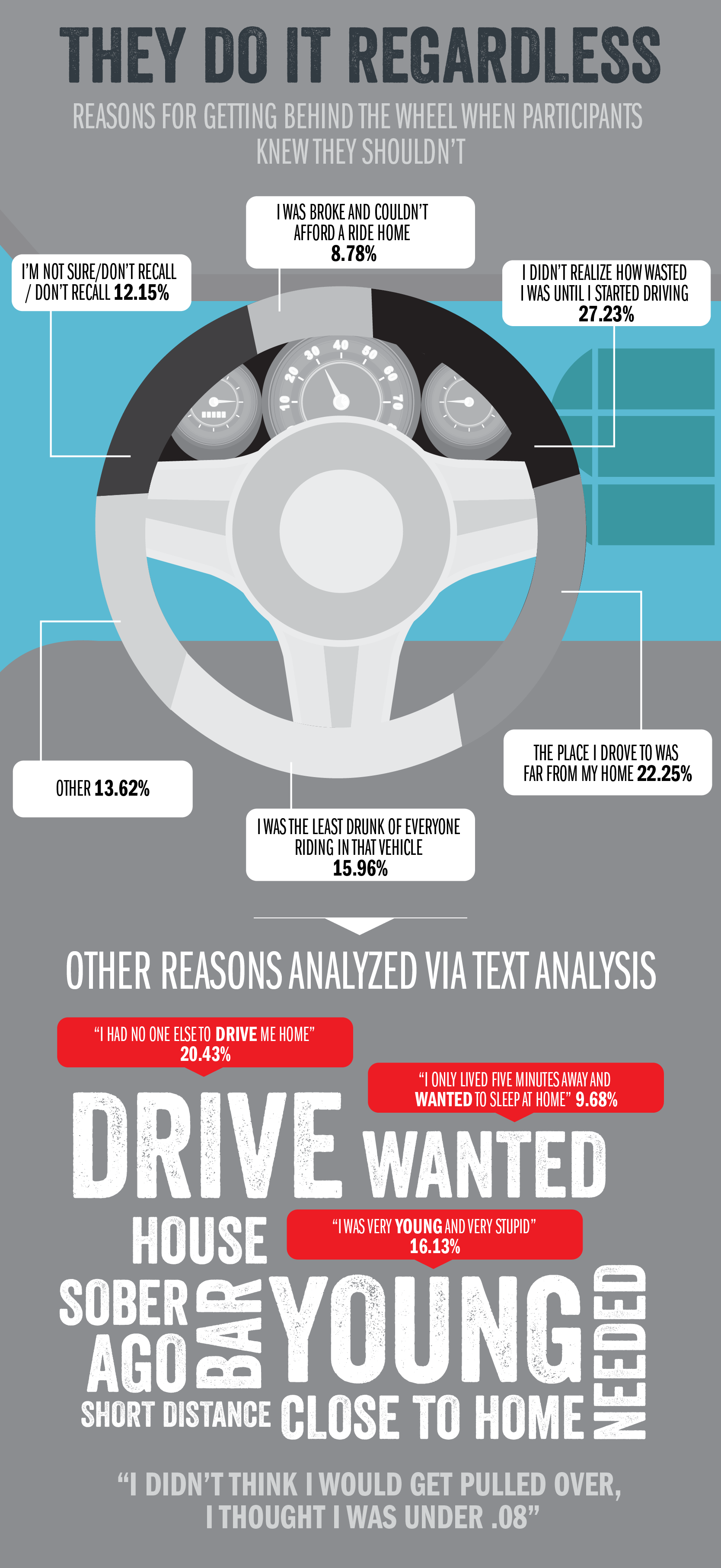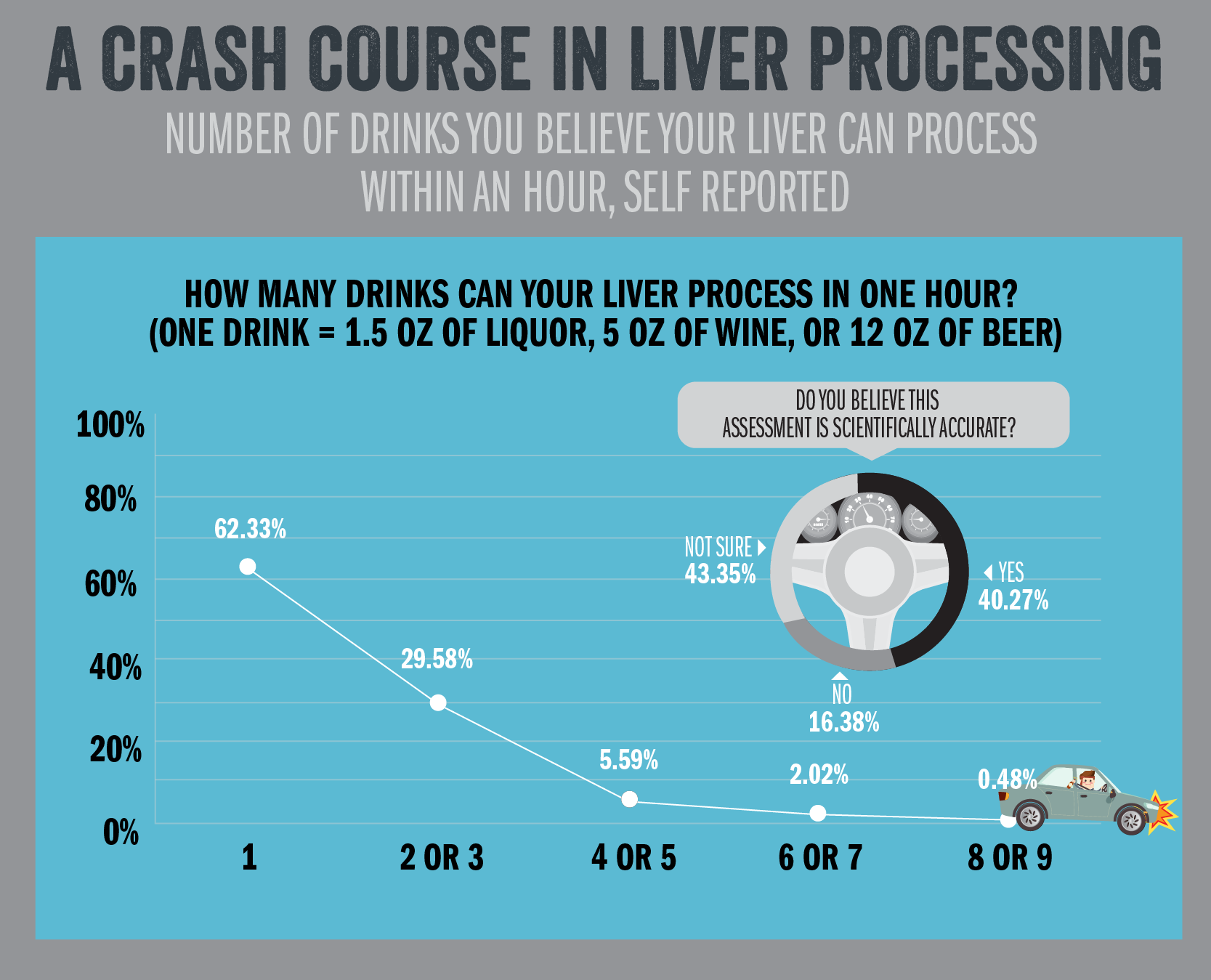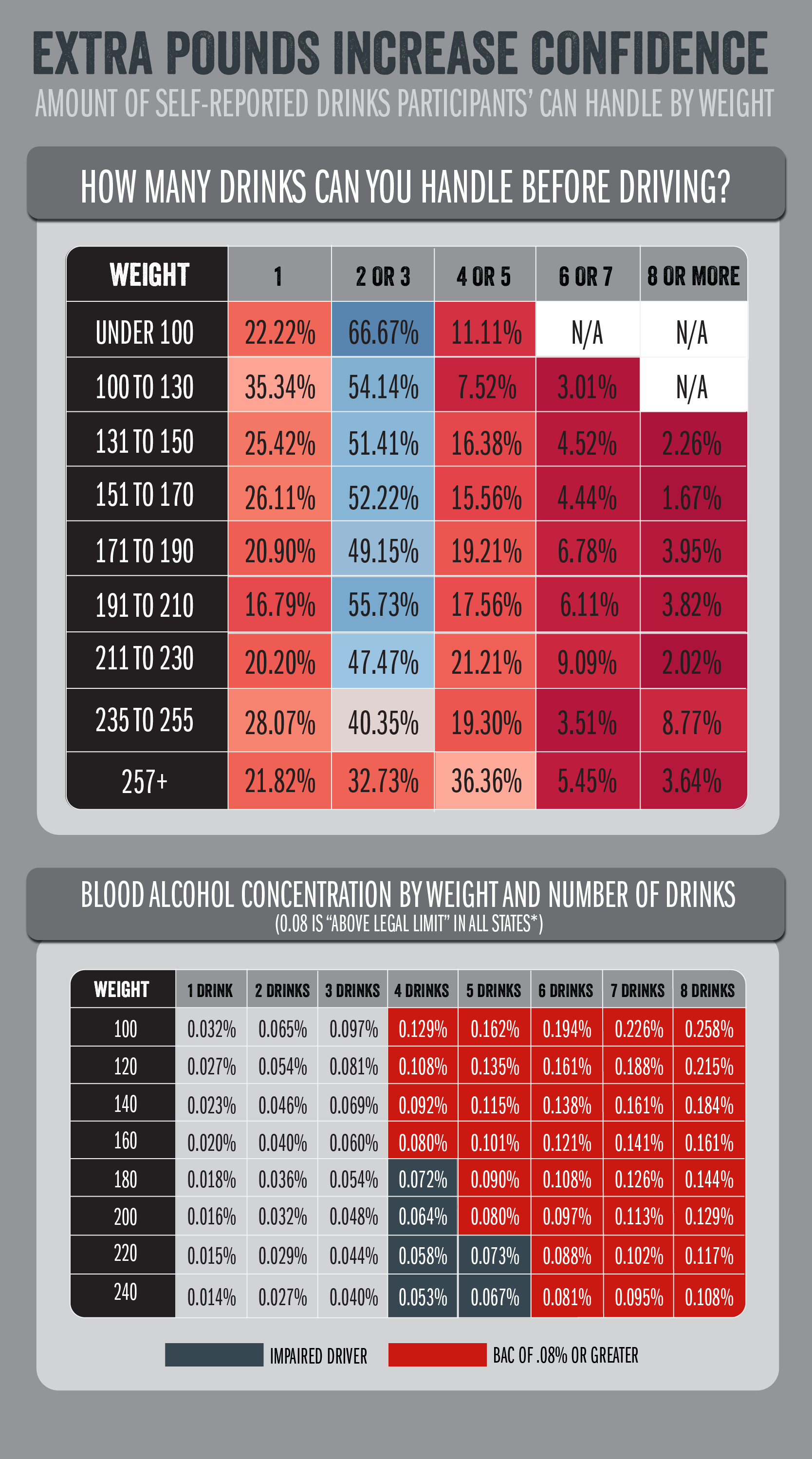
In 2019, more than 10,100 Americans died as a result of alcohol-related driving accidents. In total, these deaths accounted for nearly 1 in every 3 traffic-related fatalities across the country. While nearly 1.1 million people were arrested for driving under the influence in 2019, that number represents only one percent of the 111 million adults who identified as driving impaired the same year.
The Dangers of Drinking and Driving
With so many Americans admitting to understanding the dangers of drinking and driving and the legal and life-threatening ramifications, we wanted to know why so many people are kicking back drinks and picking up the keys. To learn why, we polled over 1,000 people across the United States to understand how many drinks they think it takes to be considered “under the influence,” what their reasoning was for drinking and driving, and which states might have the most inebriated drivers. Curious how many people in your state might be driving drunk and undetected? Read on to learn more.
Uncharted Territory
If deciding when you’re too drunk to drive was easy, there probably wouldn’t be so many online guides helping people determine just how much was too much. In reality, there’s a scientific reason why you keep drinking past what might seem like a reasonable amount after the fact – and it all comes back to the impact of alcohol on the mind and body. Research has shown that alcohol drowns out the body’s natural alarm mechanism and reaction time. Your body’s response might otherwise try to warn you when you’ve had too much. Even if you know you’re making a mistake when you’re drunk – like having just one more, going home with a complete stranger, or even getting in your car to drive home – your body might not be able to warn you in time to make a difference.
According to our survey, Americans in states with the highest reported alcohol-impaired driving incidents weren’t always the quickest to self-identify as having too much to drink. While the highest number of crashes associated with alcohol consumption in 2016 occurred in Mississippi, people we polled from Wyoming told us they often drank the most before getting in their cars to drive home. While other Southern states, including Alabama and South Carolina, also ranked among regions with the highest average alcohol-related traffic accidents per capita, it was states like Florida and Georgia where Americans told us they got “wasted” before getting behind the wheel.
Regional Ramifications
Southern states like Alabama, Texas, and Mississippi may be known for their hospitality and homestyle comfort food, but if you’re driving through one of these states you might want to be on the lookout for more than just a friendly demeanor or fried chicken. According to our survey, Americans living in the South were the most likely to admit driving home even when they knew they shouldn’t and were among the highest states in the country for alcohol-related motor vehicle crashes according to data from the National Highway Traffic Safety Administration.
In 2018, Montana had the highest rate of drunk driving deaths across the U.S., with 33 percent of all traffic related fatalities owed to drivers under the influence of alcohol and behind the wheel compared to a national average of 31 percent. In South Carolina, a person can be arrested even if their blood alcohol concentration (BAC) is below the legal limit of .08 percent just by displaying behavior consistent with a person under the influence of drugs or alcohol.
There are no open container laws governing the presence or consumption of alcohol in moving vehicles in other Southern (and some Northeastern) states (including Arkansas, Mississippi, and Connecticut). According to data from the NHTSA, the Northeast ranked as the most common region for alcohol-related crashes for adults over the age of 35.
Reckless Rationales
So, what kinds of excuses are most Americans using when they decide to drink and drive? According to our panel of men and women across the country, more than 1 in 4 admitted they didn’t realize just how drunk they were until they got behind the wheel of the car. Another 1 in 5 Americans told us they drove under the influence because they were too far from home to do anything else. If you find yourself in a dangerous situation where a friend or family member may be tempted to drive home intoxicated, you can always offer:
- Call a ride-sharing service
- Offer to drive them home yourself
- Utilize public transportation
- Contact local law enforcement
Our text analysis revealed other popular reasons people give when they realize they drove buzzed or wasted. More than 1 in 5 admitted they had no one else to help them get home, while roughly 1 in 10 said they were so close to home they didn’t think a short drive would make a difference. Research has shown more than half of all traffic accidents occur within five miles of home.
Knowing The Limit
When it comes to the amount of alcohol a person can legally drink and still be fit to drive with, there’s no magical number to help you decide when enough is enough. In reality, the legal limit is determined by a person’s blood alcohol concentration (BAC), which is calculated based on the amount of alcohol in the bloodstream or on a person’s breath. Depending on your weight, gender, and body fat percentage, the number of drinks you can have and remain under the level of 0.08 percent can vary from person to person. Still, BAC or the number of drinks a person has aren’t necessarily the only indication of a person’s impairment. Genetics, regular alcohol consumption, and even drug use can play a role in how a person is impacted by the effects of one drink versus two, three, or more.
When we asked men and women of all ages what they thought their legal limit was, the most popular answer across every generation was two or three drinks. Of those we surveyed, less wasn’t exactly more when it came to predicting what their drink ceiling should be. People we polled were more inclined to suggest four or five drinks might be their maximum than they were to assume one drink should be the limit.
Time to Process
Alcohol doesn’t just impact cognitive functions like your memory or speech; it can affect nearly every organ in the body. Alcohol abuse can cause bacteria to grow in the stomach, which can eventually cause damage to the intestinal wall and other organs. Drinking too much can also be bad for your heart, pancreas, and even put a person at risk for certain types of cancers, including mouth, esophagus, throat, and breast. Of course, one organ in the body is especially susceptible to alcohol misuse: the liver.
After a night of drinking, the liver works hard to start soaking up the toxins introduced by those liquid libations and pushing them out of the body. While liver cells do regenerate after incurring some damage, that doesn’t mean too much booze can’t still leave permanent deterioration on one of the most vital organs in the body. You may not see the effects right away, but the long-term consequences of liver damage as a result of alcohol abuse can be catastrophic. Just one night of binge drinking can lead to conditions like acute alcoholic hepatitis, causing the liver to inflame and creating symptoms such as abdominal pain, nausea, and vomiting.
People we polled had fairly realistic expectations of the amount of alcohol their bodies were able to physically process each hour. More than 62 percent suggested their liver could only handle one drink every 60 minutes, while less than 30 percent suggested the maximum was between two or three drinks. Less than eight percent told us they thought their bodies could process more than four drinks each hour.
Weighing In on Legal Limits
While weight can play a role in the number of drinks a person can have and remain under the legal drinking limit, our survey revealed a higher weight gave some Americans a false sense of security regarding how much they could consume without becoming impaired.
Nearly 1 in 10 people we polled weighing between 211 and 230 pounds told us they could drink six or seven alcoholic beverages and still be safe to drive. In reality, a person weighing 220 pounds would be over the .08 percent BAC limit by the time they got to their sixth drink and a person weighing 200 pounds would be over the limit by five. Nearly nine percent of men and women weighing between 235 to 255 pounds went so far as to suggest they could drink eight or more alcoholic beverages and still be safe to drive while in reality, their BAC could be close to .108 percent – well over the legal limit.
The Big Picture
In the U.S., 28 people die every day from car accidents that involve at least one alcohol-impaired driver. That amounts to one death every 51 minutes. According to people we surveyed, more adults drive under the influence than are identified by police or arrests, often for unnecessary reasons including not realizing they were drunk, not having a designated driver available, not wanting to call a cab, or being so close to home they didn’t think driving intoxicated would make a difference.
If you or someone you love is battling with alcohol addiction, help is here for you. At FHE Health, a premier mental health and addiction treatment facility, our goal is to help you find sober living through a dedicated and personalized treatment plan meant to address your body, spirit, and mind. With inpatient and outpatient care options, FHE Health will help you find care that works for your needs without compromising the treatment process. You are not alone and your best life is waiting for you. Let us help get you there. To learn more, visit us online at FHERehab.com or call 1-866-978-3870 today.
Methodology
We surveyed 1,028 Americans and asked about their alcohol-related drinking habits in conjunction with operating a motorized vehicle. In addition, we queried the National Center for Statistics and Analysis (NCSA) Motor Vehicle Traffic Crash Data Resource Page (CrashStats) for alcohol-related crashes in 2016 by state. Additional data on Blood Alcohol Concentration levels was taken from Nolo.com.
Want to use our study?
Please feel free! All that we ask is that you include a link back to this page so readers can learn more about the study.
Sources
- https://www.iii.org/fact-statistic/facts-statistics-alcohol-impaired-driving
- https://www.huffingtonpost.com/entry/7-ways-to-know-youre-drunk_us_58b43a44e4b0658fc20f97f9
- https://www.cnet.com/news/drunk-people-know-what-theyre-doing-and-dont-care-says-research/
- https://backgroundchecks.org/which-states-have-the-worst-dui-problems.html
- https://www.cdc.gov/motorvehiclesafety/pdf/impaired_driving/drunk_driving_in_sc.pdf
- https://www.huffingtonpost.com/2014/01/24/open-container-law_n_4653013.html
- https://guardianinterlock.com/blog/stop-drunk-driver-tracks/
- https://mcwell.nd.edu/your-well-being/physical-well-being/alcohol/blood-alcohol-concentration/
- https://health.clevelandclinic.org/2016/07/6-surprising-ways-alcohol-affects-health-not-just-liver/
- https://tonic.vice.com/en_us/article/ezwjqp/how-to-tell-if-your-liver-is-screwed












